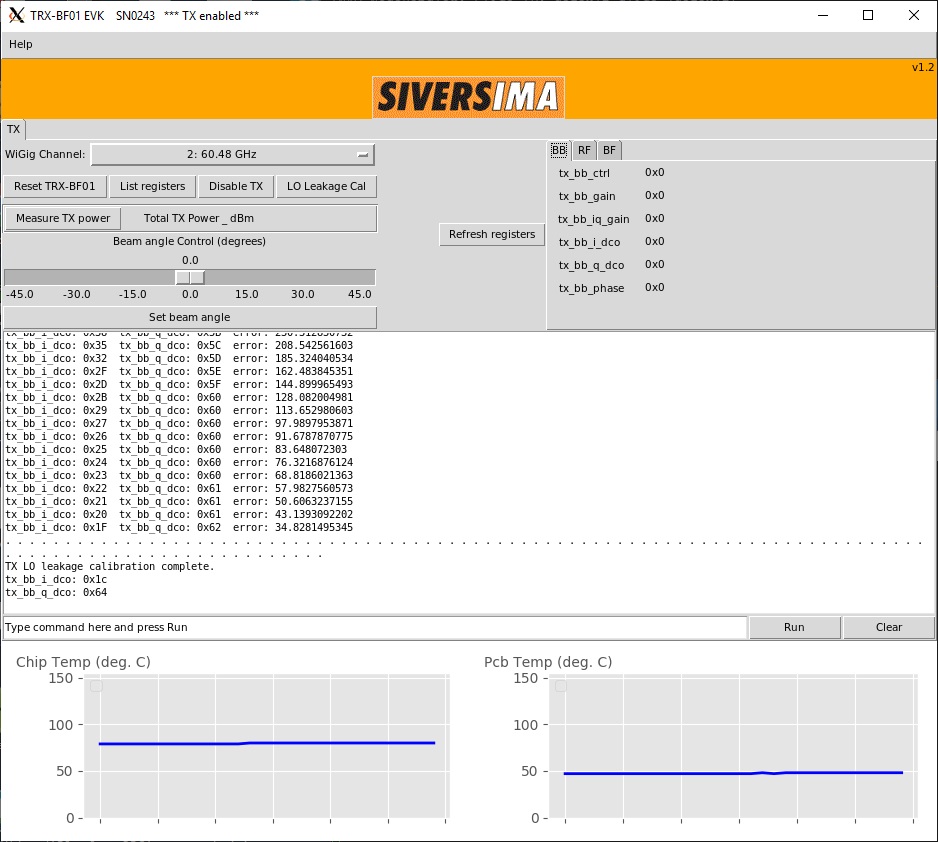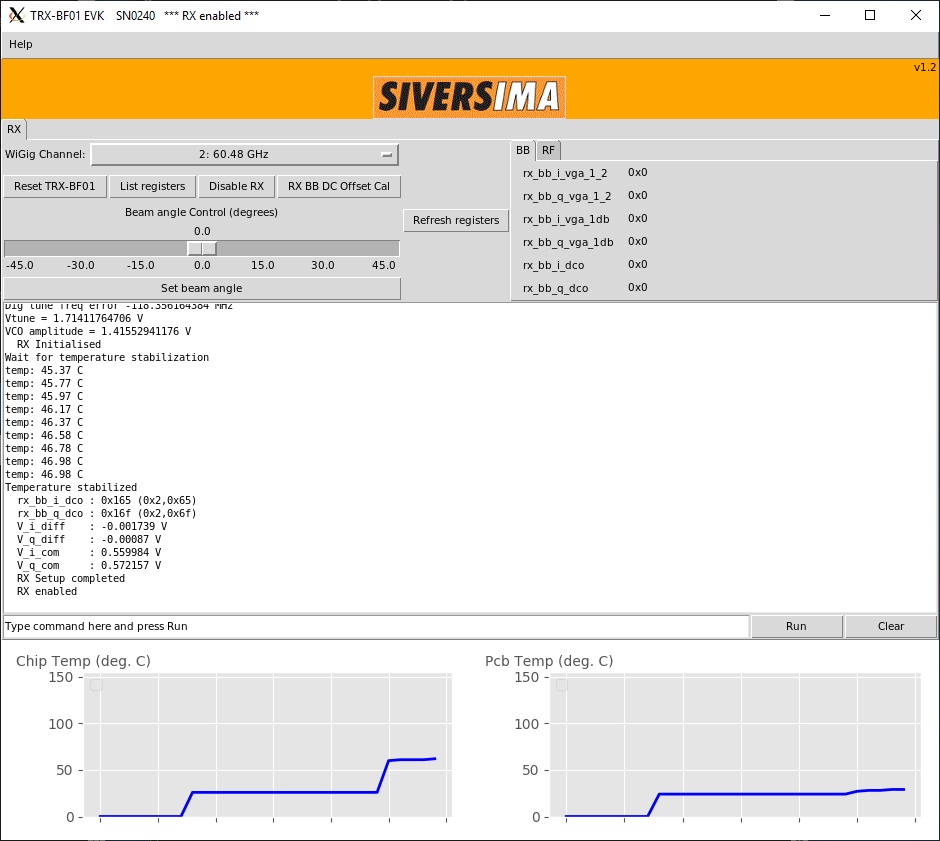| Version 13 (modified by , 6 years ago) ( diff ) |
|---|
mmWave Channel Sounding on SandBox1 (IN PROGRESS)
Description
Prerequisites
In order to access the test bed, create a reservation and have it approved by the reservation service. Access to the resources is granted after the reservation is confirmed. Please follow the process shown on the COSMOS work flow page to get started.
Resources required
4 servers srv1-lg1 to srv4-lg1, 2 USRP X310s rfdev3-1, rfdev3-2 and both the Sivers platforms rfdev3-5, rfdev3-6 on COSMOS SB1.
Tutorial Setup
Follow the steps below to gain access to the sandbox 1 console and set up nodes with appropriate images.
- If you don't have one already, sign up for a COSMOS account
- Create a resource reservation on sandbox 1
- Login into sandbox 1 console (console.sb1.cosmos-lab.org) with two SSH sessions.
- Make sure all the nodes and devices used in the experiment are turned off:
omf tell -a offh -t srv1-lg1,srv2-lg1,srv3-lg1,srv4-lg1,rfdev3-1,rfdev3-2,rfdev3-5,rfdev3-6
- The image rfnoc_wigig.ndz has aforementioned RFNoC 802.11ad preamble processing blocks installed.
Load rfnoc_wigig.ndz on srv1,srv2. The image sivers_sb1_cosmos.ndz has UHD and Sivers control software installed.
Load sivers_sb1_cosmos.ndz on srv3,srv4. Load the images on the computing nodes
omf load -i rfnoc_wigig.ndz -t srv1-lg1,srv2-lg1
omf load -i sivers_sb1_cosmos.ndz -t srv3-lg1,srv4-lg1
- Turn all the required resources on and check the status
omf tell -a on -t srv1-lg1,srv2-lg1,srv3-lg1,srv4-lg1,rfdev3-1,rfdev3-2,rfdev3-5,rfdev3-6
omf stat -t system:topo:allres
- ssh to the nodes, use option -Y for using GUI.
Experiment Execution
Find and prepare USRPs
- The IP addresses for Ethernet Port 1(10G) on the X310s sdr2-md2 and sdr2-md3 were hard-coded to 10.115.2.2 and 10.115.2.3 respectively. To access them from srv1-lg1 or srv2-lg2, configure the network interface eno2 as follows
root@srv2-lg1:~# ifconfig eno2 10.115.1.1 netmask 255.255.0.0 mtu 9000 up root@srv2-lg1:~# ifconfig eno2 eno2: flags=4163<UP,BROADCAST,RUNNING,MULTICAST> mtu 9000 inet 10.115.1.1 netmask 255.255.0.0 broadcast 10.115.255.255 inet6 fe80::9a03:9bff:fe61:b0b1 prefixlen 64 scopeid 0x20<link> ether 98:03:9b:61:b0:b1 txqueuelen 1000 (Ethernet) RX packets 4661357820 bytes 37005247545892 (37.0 TB) RX errors 0 dropped 692293 overruns 0 frame 0 TX packets 59454137 bytes 3576874343 (3.5 GB) TX errors 0 dropped 0 overruns 0 carrier 0 collisions 0
- Run uhd_find_devices to check if the X310s can be reached
root@srv2-lg1:~# uhd_find_devices --args="addr=10.115.2.3" [INFO] [UHD] linux; GNU C++ version 7.4.0; Boost_106501; UHD_3.14.1.1-release -------------------------------------------------- -- UHD Device 0 -------------------------------------------------- Device Address: serial: 31B6FFA addr: 10.115.2.3 fpga: HG name: sdr2-md3 product: X310 type: x300
- Check which RFNoC blocks the are loaded on the X310s, by running uhd_usrp_probe
root@srv1-lg1:~# uhd_usrp_probe --args="addr=10.115.2.2"
- Following is the list of RFNoC blocks required for the experiment
| | | RFNoC blocks on this device: | | | | | | * DmaFIFO_0 | | | * Radio_0 | | | * Radio_1 | | | * PacketDetector_0 | | | * CFOC_0 | | | * DDC_0 | | | * DUC_0 | | | * FIR_0 | | | * SymbolTiming_0 | | | * BoundaryDetector_0 | | | * CIR_0 | | | * FIFO_0 | | | * FIFO_1
- If the required RFNoC blocks are not found, load X310 with MISO_IMAGE_x300.bit
root@srv1-lg1:~# uhd_image_loader --args="addr=10.115.2.2,type=x300" --fpga-path="ORCA_MISO_PROJECT/FPGA_IMAGES/MISO_IMAGE_x300.bit"
- Power cycle X310 to use the new image, and run uhd_usrp_probe to check RFNoC blocks.
root@console:~# omf tell -a offh -t rfdev3-1
root@console:~# omf tell -a on -t rfdev3-1
Prepare Sivers 60GHz front-ends
- To demonstrate the experiment here, we use Sivers front-end SN0243 as transmitter and SN0240 as receiver
*
| SN0243 as transmitter | SN0240 as receiver |
 | 
|
- Configure SN0243 as transmitter using "TX enable" on the GUI
root@srv3-lg1:~/ederenv# ./start_mb1.sh --gui SN0243

|
- Configure SN0240 as receiver using "RX enable" on the GUI on srv4-lg1
root@srv4-lg1:~/ederenv# ./start_mb1.sh --gui SN0240

|
Run the experiment
- Start transmit application TX_TEST.grc on transmit node(srv1-lg1).
root@srv1-lg1:~# gnuradio-companion TX_TEST.grc
- Start receive application RX_OTA_TEST.grc on receive node(srv2-lg1).
root@srv2-lg1:~# gnuradio-companion RX_OTA_TEST.grc
Attachments (9)
- Sivers_TX_GUI.jpg (174.4 KB ) - added by 6 years ago.
- Sivers_RX_GUI.jpg (126.9 KB ) - added by 6 years ago.
- Sivers_RX_SN0243.jpg (128.2 KB ) - added by 6 years ago.
- Sivers_TX_SN0240.jpg (162.6 KB ) - added by 6 years ago.
- radiorx_cir_grc.jpg (204.4 KB ) - added by 6 years ago.
- tx_test_grc.jpg (165.9 KB ) - added by 6 years ago.
- CIR_0.jpg (33.2 KB ) - added by 6 years ago.
- CIR_neg5.jpg (32.8 KB ) - added by 6 years ago.
- MISO_tutorial.jpg (256.2 KB ) - added by 5 years ago.
Download all attachments as: .zip
Note:
See TracWiki
for help on using the wiki.
